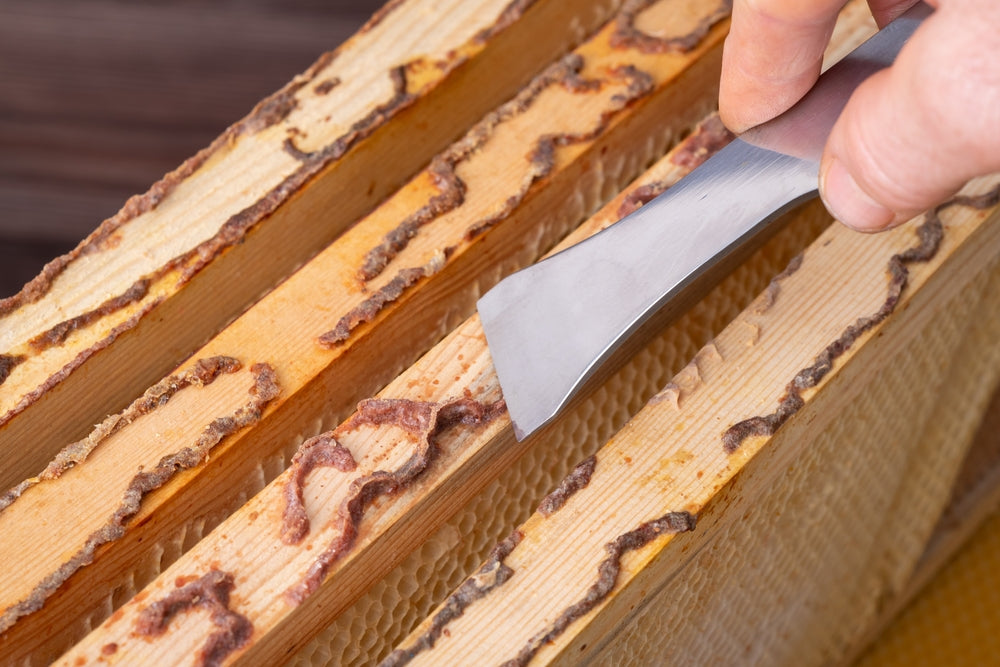“Hold on, bees make more than just honey?” is the response we normally get when we start talking about our range of bee products. The answer? YES! Bees make more products that can benefit humans, besides honey. And bee propolis is a big one.
You can find bee propolis pretty easily these days. It comes in sprays, supplements, extracts, and tinctures that make it easy for humans to consume. Let’s break down what propolis is and why trying some would be doing you and the bees a favor.
What Is Bee Propolis? (+ how it’s made)
Propolis, also known as bee glue, is a resinous substance that bees collect from trees and plants. Ever wonder how bees make those incredible honeycomb hives? They’re not made of honey, we can tell you that! Bees use a combination of wax and propolis to create a safe, smooth structure to house the colony, nurture baby bees, protect the queen, and, of course, store their honey. Beeswax provides the structural component, but propolis act like a sealant that keeps honey and heat in and cold and bacteria out.
Propolis even has antibacterial and antifungal properties, so bees use it to line the brood cells, creating a sterile environment for the developing young.
Oh, and get this: bee propolis is even a defense mechanism. If there’s an intruder in the hive—a foreign bee or another bug—bees pile on propolis to immobilize it and stop the spread of its germs. Bees definitely know how to quarantine.

Why Is Propolis Good for You?
Bee propolis can benefit people in many of the same ways it benefits a colony of bees. Propolis is a natural protectant against harmful bacteria. Bees and plants use it to protect and disinfect. And the best part? It’s completely natural. Anyone else need a little break from synthetic immune boosters and hand sanitizer?
Let’s break down how propolis can naturally back up your immune system:
Antimicrobial Activity: Propolis contains compounds that can help fight bacteria and fungi. This contributes to a stronger immune system and potentially helps heal wounds.
Antioxidants: Propolis is rich in antioxidants, substances that can neutralize harmful free radicals in the body. Free radicals can damage cells and contribute to various health concerns.
Anti-inflammatory Effects: Studies suggest propolis might have anti-inflammatory properties. This could be beneficial in alleviating symptoms associated with inflammation-related conditions like arthritis.
How Do You Use Bee Propolis?
When it’s collected raw, propolis is sticky and tacky with a brittle consistency once dried. Propolis undergoes a few necessary processing steps to make it suitable for consumption:
- Cleaning and purification: This removes debris, unwanted materials, and reduces the risk of potential contamination.
- Concentration: Raw propolis often contains a high concentration of inactive components. Processing methods can concentrate the desired bioactive compounds like flavonoids and phenolic acids.
- Absorption: Propolis is often mixed with other compounds to make it palatable and easier to absorb by the body.
Honey Gardens stocks high-quality bee propolis in a variety of delicious forms from syrups to sprays to supplements. For colds and sore throats, bee propolis tincture spray may be a lifesaver! You can also enjoy it on your pancakes with a blend of yummy fruits and herbs. Or you can pop an easy capsule on your way out the door.
Investing in local and thoughtfully processed honey products is a boon to the bees, because it promotes proper bee management. So next time you’re looking for a natural immune booster or mild remedy, give bee propolis a try. You’ll bee glad you did. 🐝
